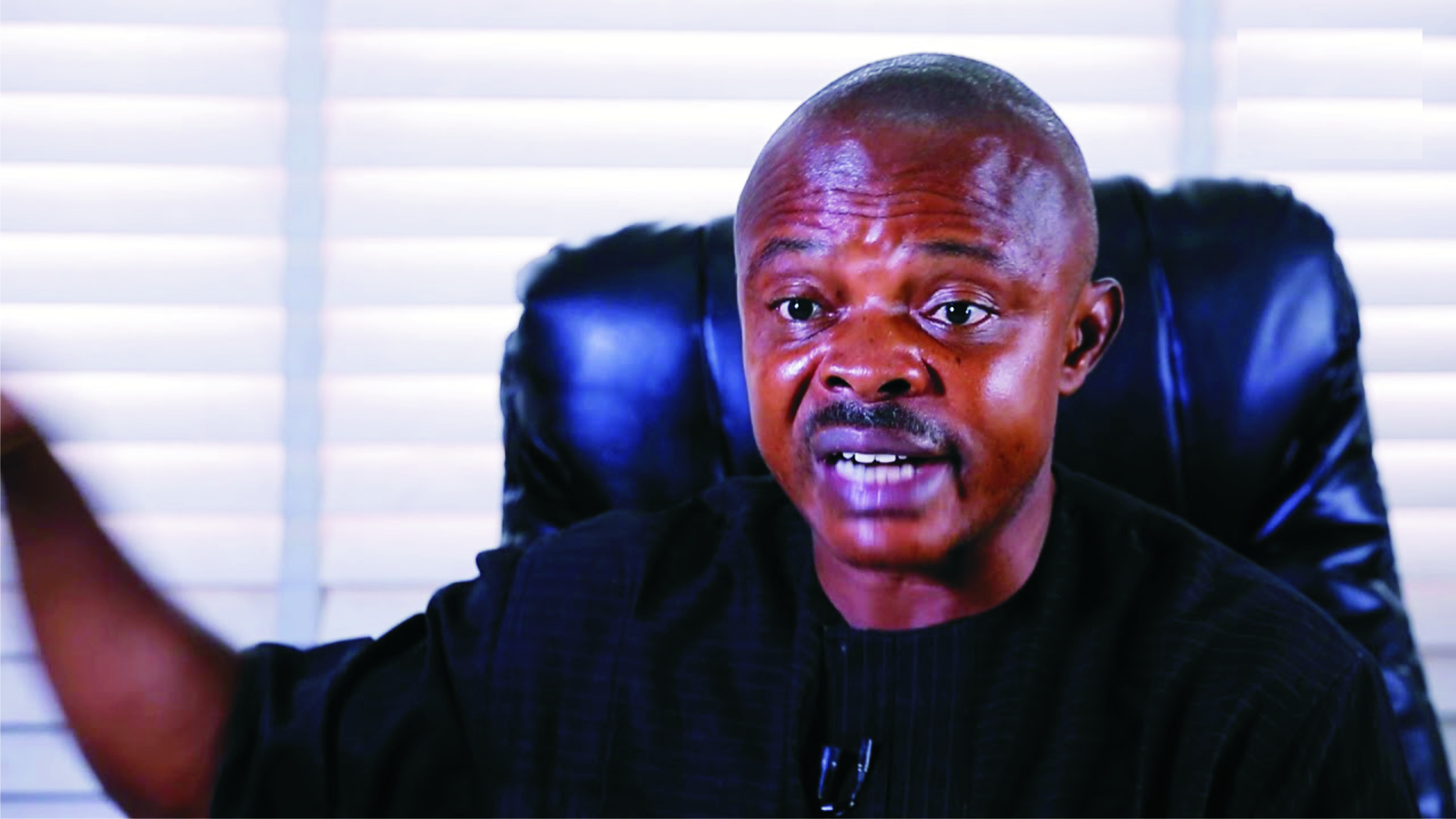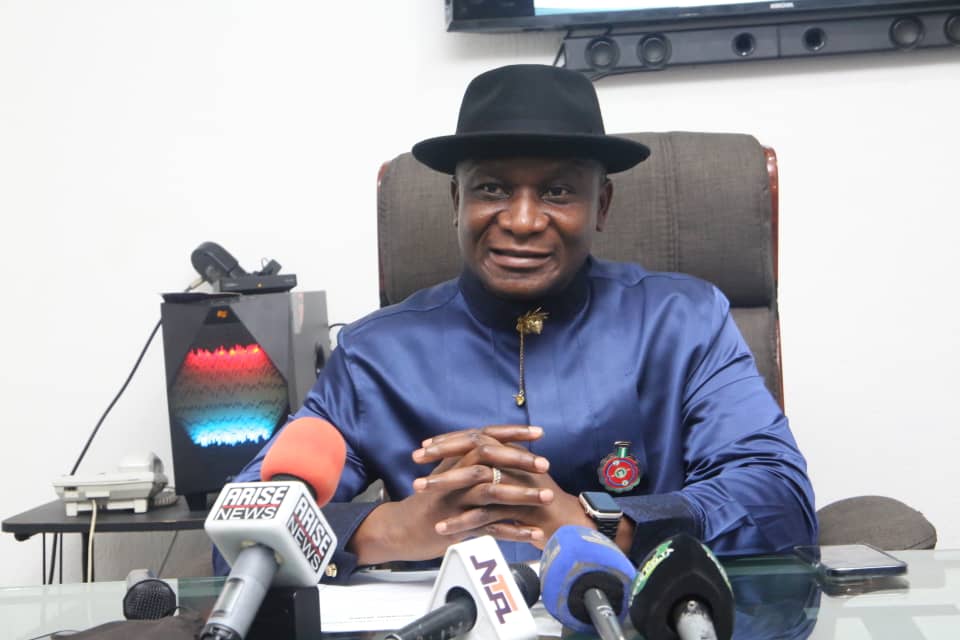News
Lack Of Trust In African Govts Impeding Democracy -Lumumba
Pan-Africanist and human rights activist, Patrick Lumumba, has said that the deficit of trust in governance in many African countries is impeding democracy and development on the continent.
Lumumba, who is a Founding Trustee of the African Institute for Leaders and Leadership, stated this in a keynote address he delivered at the second edition of the Goodluck Jonathan Foundation Democracy Dialogue Series held at the Nigerian Content Development and Monitoring Board Tower Hall in Yenagoa, Bayelsa State, yesterday.
The theme of this year’s dialogue was “Breaking New Grounds in the Democracy-Development Nexus in Africa”.
The former director of the defunct Kenyan anti-corruption commission pointed out that trust was one majority element lacking in African governments and democracies, adding that the time has come for Africa to examine what constituted democracy.
Lumumba, while commending the GJF for organising the democracy dialogue, said, “We are assembled here to remind ourselves that the reason why we lament about Africa is that it appears that the systems of governance that we inherited, and that we have been deploying for our benefit continue to put us at the foot of the ladder. We do not complain because there have been no changes or improvements in our circumstances.
“This continent of Africa, this continent that is divided into 54 countries, is it not the time that we must examine what constitutes democracy? Is there something in our tradition of governance that we can take and help how we govern? Is there something like that?
“That is the question I want us to consider. Is there a possibility that the elections we hold, that we do not understand, are the disrupters of our democracy in Africa? That we spend so much time in them? And that the only thing that is lacking in African governments is actually trust. Do we trust each each other?”
Speaking at the forum, the President of the ECOWAS Commission, Omar Touray, described the theme as “most appropriate and timely” as the dialogue took place at a time when the avowed goal of entrenching democracy and sustainable peace in West Africa was being put to a stern test.
He said, “Unconstitutional change of government, which involves military coups d’etat and unconstitutional maintenance of power by incumbents, have been on the rise in the recent past in Africa generally, and in West Africa, in particular, military coups have heightened insecurity, stagnated growth, increased poverty, inequality and limited popular participation in governance.”
Touray, however, said that ECOWAS was delighted with the Democracy Dialogue as it would lead to concrete proposals to optimize the nexus between democracy and development in Africa.
In his remarks, former President Goodluck Jonathan stated that the GJF annual Democracy Dialogue was not aimed at bringing any nation down but rather a forum that brings together stakeholders across Africa to critically examine issues of democracy, interrogate the practice in Africa and make suggestions where necessary.
Jonathan, who is the Founder and Chairman of GJF, said the theme of the dialogue underscored the fact that “we need to see democracy beyond elections and critically look at the nature of our elections and what happens after elections by way of governance.”
He said, “The dialogue is not meant to bring any nation down; it does not target any particular country or group. The focus is mobilizing citizens through effective conversations with the mind of setting an agenda for the political development of the continent.
“Leadership should work towards ensuring that democracy translates into economic well-being of the citizens. We need to look at the gap in our democratic systems and seek to understand why democracy in many of our societies has been unable to guarantee peace and economic growth for the citizens.
“Democracy should be able to encourage development and help ensure social growth of the society. Democracy is about the people and should be able to uplift the social condition of the citizens. Democracy draws its strength from the people; we must work to ensure that its impact in the lives of the people is felt and appreciated.”
News
May Day: Labour Seeks Inclusiveness In Policy-making

The Organised Labour yesterday, called on the Federal Government to ensure inclusiveness in policy making and guide against erosion of rights, such as free speech and association.
The President, Nigeria Labour Congress (NLC), Mr Joe Ajaero made the call at the 2025 Workers’ Day celebration held at the Eagle’s Square, Abuja.
The Tide source reports Ajaero and the President, Trade Union Congress, Mr Festus Osifo delivered a joint statement on behalf of the organised labour at the event.
Ajaero described May Day as, not only a moment to honour workers’ sacrifices, but also a platform to demand justice and accountability from those in public office.
He frowned at the alleged suppression of protests, and the erosion of rights of workers by some agents
According to him, workers have a duty to resist economic injustice, insecurity, and policies that undermine their dignity.
Speaking on the theme of the day, the NLC President underscored the need for Nigerian workers to reclaim the civic space and resist policies that contribute to worsening economic conditions.
“Our theme this year – “Reclaiming the Civic Space in the midst of Economic Hardship – reflects the urgent need for citizens to protect democracy and push back against repression.
“The civic space, where Nigerians express their concerns and challenge injustices is shrinking.
“If we fail to reclaim this space, the foundation of our democracy risks collapse,” he said
Ajaero, therefore, urged workers to unite and resist division, fear, and despair.
He also urged them to mobilise and organise for change, declaring that the right to demand better conditions is non-negotiable.
“Without workers, there is no society; without labour, there is no development. We must take our place in the fight for economic justice and democratic governance.”
Speaking in the same veins, Osifo said workers are the backbone of the nation—the educators, healthcare providers, builders, farmers, and innovators who sustain its economy -.
He stressed the need for the labour to reclaim the civic space even in the midst of economic hardship.
News
2025 UTME: JAMB Disowns Site Requesting Payment From Candidates

The Joint Admissions and Matriculation Board (JAMB) has disassociated itself from a fraudulent site requesting payments from candidates who missed the ongoing 2025 Unified Tertiary Matriculation Examination (UTME).
The board said that the site, “Copyrightwriter Personal J Rescheduling Flw” and account number 8520641017 at Sterling Bank, associated with it, are scam.
The disclaimer is contained in a statement made available to newsmen in Abuja on Thursday by the Board’s Public Communication Advisor, Dr Fabian Benjamin.
Benjamin said the account is being exploited to defraud unsuspecting candidates who missed their UTME.
“We issue this urgent notice to inform the public about this nefarious scheme targeting candidates who were unable to participate in the UTME.
“Some unscrupulous individuals are deceitfully soliciting payments of N15,700 under the false pretence of offering rescheduling services for the examination.
“Let us be unequivocal: this, it is a blatant scam, and we are confident that the public will not fall prey to such cheap and regressive tactics.
” The individuals behind this scam have no affiliation with JAMB or any legitimate government agency.
“The account details provided in these communications are entirely fictitious and bear no connection to any official processes; they exist solely for the purpose of perpetrating fraud,” he said.
Benjamin called on Sterling bank to take immediate and decisive action against this criminal activity.
According to him, JAMB has reported the matter to the relevant security agencies and actively pursuing those responsible for this deceitful act.
He further said that “JAMB does not reschedule examinations for candidates who miss their scheduled tests due to reasons unrelated to the Board’s actions”.
He, however, said that the Board is conducting a thorough investigation for candidates whose biometrics failed during verification and were thus unable to sit for the examination.
He said those without discrepancies would be invited to retake the examination at no cost , stressing that “no cost is required”
“It is imperative to understand that JAMB does not charge any fees for examinations after a candidate has completed their registration.
“We strongly urge all candidates to remain vigilant and not to succumb to these fraudulent schemes.
“Protect yourselves and report any suspicious activity immediately,” he explained.
News
NDDC Seeks UN’s Support To Accelerate Niger Delta Development

The Niger Delta Development Commission (NDDC) has expressed its willingness to partner with the United Nations (UN) to accelerate the development of the Niger Delta region.
Dr Samual Ogbuku, Managing Director of the NDDC, made the appeal in a statement issued by the commission’s Director of Corporate Affairs, Mrs Seledi Thompson-Wakama, in Port Harcourt on yesterday.
According to the statement, Ogbuku sought the UN’s support during his visit to the UN Resident and Humanitarian Coordinator (UNRHC), Mr Mohammed Fall, at the UN regional office in Abuja.
He called on the global body to provide the NDDC with technical assistance and expert services to support the region’s development.
“We are eager to collaborate with the UN, recognising that the state governments in the region and the NDDC alone cannot achieve the level of regional development required,” he said.
Ogbuku identified key areas where support would be needed, including the provision of portable and affordable drinking water powered by high-tech solar energy sources.
He also highlighted the importance of reforesting the mangrove swamps, which have been severely damaged by decades of environmental degradation caused by oil exploration in the Niger Delta.
“Although the NDDC has made progress in providing solar-powered streetlights across the region, we still require UN support in delivering solar energy solutions for residential buildings.
“We also wish to explore the possibility of installing solar mini-grids in homes across communities, which would boost local commerce and trade,” he added.
The NDDC managing director further appealed for increased UN involvement in areas such as healthcare, education, youth training, gender development, and food security.
Ogunku stated that such interventions would significantly enhance the standard of living in the region.
In response, Fall affirmed the UN’s readiness to collaborate with the NDDC to fast track development in the Niger Delta.
He assured that the UN would support initiatives in food security, job creation, education, and renewable energy, among other areas.
“We aim to approach development in the Niger Delta holistically, rather than focusing solely on environmental pollution.
“This is merely an entry point; however, the UN’s development vision aligns with the Sustainable Development Goals (SDGs), which are designed to positively impact various aspects of people’s lives,” Fall stated.
He assured the NDDC of continued and fruitful engagements to drive the region’s development.

